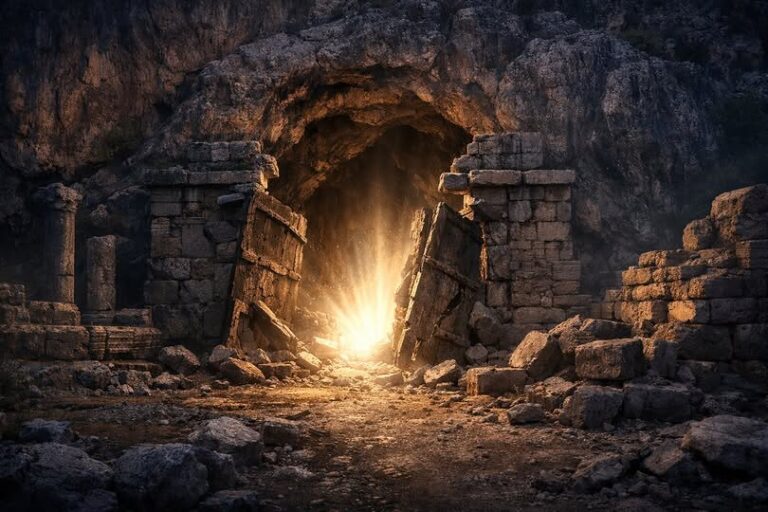
Throughout Scripture, Yahweh is not only the God of Israel, but the sovereign over all creation. His plan of redemption was never confined to one people group—it was always meant to culminate in the reclaiming of all the nations that had once been given over to other elohim (Deut 32:8–9). In this article, we explore how Yahweh used the tragedy of Israel’s exile to strategically plant faithful communities within Gentile territories, effectively establishing sleeper cells under the dominion of hostile spiritual powers. At Pentecost, these cells were awakened and empowered by the Holy Spirit, beginning the reversal of Babel’s judgment and reestablishing Israel’s priestly mission to the world.
The Context: Yahweh’s Judgment and the Disinheritance of the Nations
In Genesis 11, humanity’s collective rebellion at Babel led to Yahweh’s disinheritance of the nations. According to Deuteronomy 32:8–9 (in line with the Dead Sea Scrolls and the Septuagint), God divided the nations according to the number of the sons of God, assigning them to lesser elohim while reserving Israel as His own inheritance. These spiritual beings, meant to administer justice and point the nations back to their Creator, instead became corrupt and sought their own worship (Psalm 82).
Yahweh’s plan, then, was to create a new nation—Israel—through Abraham, and to use them as a light to the Gentiles (Isaiah 42:6; 49:6). However, Israel herself often failed in this role, succumbing to idolatry and injustice. When judgment came in the form of exile, it looked as though Yahweh’s plan had faltered.
But what appeared to be defeat was actually strategic infiltration.
Exile as Infiltration: The Scattering of the Faithful
The Assyrian exile of the northern kingdom and the Babylonian exile of Judah were not just punishments—they were covert operations. As the people of Israel and Judah were scattered among the nations, they brought with them the knowledge of the one true God. Even in captivity, men like Daniel, Esther, Nehemiah, and Ezekiel maintained their allegiance to Yahweh, often in high positions of power. These faithful believers were embedded behind enemy lines, carrying the hope of Israel’s God into the very courts of the gods of the nations.
Some key effects of exile as infiltration:
- Establishment of synagogues: During and after the Babylonian exile, Jewish communities began forming synagogues—centers of teaching and worship of Yahweh. These sprang up in major cities throughout the empire, especially in areas like Mesopotamia, Egypt, and Asia Minor (cf. Acts 15:21).
- Creation of the Diaspora: The Jewish Diaspora became a network of communities that maintained a hope in the God of Israel. Though cut off from the Temple, they preserved the Scriptures, taught their children, and awaited the fulfillment of God’s promises.
- Embedded prophetic expectation: These communities knew of the promise of a coming Messiah and the restoration of Israel, which would ultimately include the Gentiles being brought back into relationship with Yahweh (Isaiah 2:2–4; Micah 4:1–3).
In this way, Yahweh had planted outposts in nearly every corner of the Gentile world—under the noses of the very elohim who had rebelled against Him.
Pentecost: The Reversal of Babel and the Activation of the Faithful
At Pentecost (Acts 2), something unprecedented occurred. Faithful Jews from “every nation under heaven” (Acts 2:5)—nations once disinherited—had come to Jerusalem for the feast. These weren’t newcomers; they were the children of the exile, the Diaspora faithful who had preserved Yahweh’s worship in foreign lands for generations. They were living in Parthia, Media, Elam, Mesopotamia, Judea, Cappadocia, Pontus, Asia, Phrygia, Pamphylia, Egypt, Libya, Rome, Crete, and Arabia—each location tied to an ancient Gentile power.
When the Holy Spirit descended, these believers spoke in the languages of those very nations, signaling a supernatural reversal of Babel. Where once languages had divided and scattered, now they united and commissioned. These were not random pilgrims—they were agents being activated.
Pentecost was not only the birth of the Church—it was the redeployment of Yahweh’s kingdom. Those who had carried hope into exile now carried the gospel back to the nations. The mission of Israel to be a kingdom of priests (Exodus 19:6) was reborn in those who accepted Jesus as Messiah and received His Spirit.
The Mission Restored: Priests to the Nations
Peter’s words in 1 Peter 2:9 echo the Sinai covenant:
“But you are a chosen people, a royal priesthood, a holy nation, God’s special possession, that you may declare the praises of Him who called you out of darkness into His wonderful light.”
This calling wasn’t revoked with exile—it was reignited at Pentecost. The Church became the renewed Israel, composed of both Jew and Gentile, fulfilling the ancient promise to Abraham: that through his offspring all the nations of the earth would be blessed (Genesis 12:3).
Now, believers—whether of Jewish or Gentile background—were tasked with reclaiming the nations, not through conquest, but through witness. Just as the apostles and early missionaries like Paul found synagogues in nearly every city they visited, they were walking into ground that had already been seeded during the exile.
Conclusion
Yahweh’s ways are not our ways. What looked like a national defeat was divine strategy. What seemed like a loss was preparation. The exile set the stage for global redemption. Pentecost was not only the empowering of the Church—it was the signal that the time had come to reclaim the world.
From Babel to Babylon to Jerusalem and back to the nations, Yahweh’s plan has always been to bring all people back into His family. The elohim who ruled the nations thought they had won. But right under their watchful eyes, God had planted the very people who would bring their downfall—redeemed humans filled with the Spirit of the Most High.
Discussion Questions
- How does the exile reshape our understanding of God’s sovereignty in times of apparent defeat?
- In what ways did the Jewish Diaspora help prepare the Gentile world to receive the gospel?
- What parallels can we draw between the reversal at Pentecost and the judgment at Babel?
- How does the idea of believers being “planted” behind enemy lines affect our understanding of spiritual warfare?
- What can modern believers learn from Israel’s priestly calling to be a light to the nations?
Want to Know More?
- Michael S. Heiser, The Unseen Realm: Recovering the Supernatural Worldview of the Bible – Especially helpful on the Divine Council and the strategic role of the nations and their gods.
- N. T. Wright, Paul and the Faithfulness of God – Explores how Paul viewed the return to the Gentiles as a fulfillment of Israel’s mission.
- Craig Keener, Acts: An Exegetical Commentary, Vol. 1 – In-depth treatment of Pentecost and its connection to diaspora Jews and ancient prophecy.
- John Walton, The Lost World of the Torah – While not directly focused on exile, it helps frame Israel’s mission as priests to the nations.
- Timothy Tennent, Invitation to World Missions: A Trinitarian Missiology for the Twenty-first Century – Insight into how mission has always been Yahweh’s intent for Israel and the Church.




